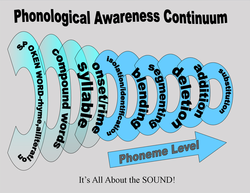Purpose and Goal
This site was created by Oklahoma Reac3h Instructional Coaches in order to provide information to parents and educators. The sample lesson plans and activities are intended to use as a guide in determining activities designed to promote phonological awareness. Our goal is to provide both the definition of phonological awareness and stress the important role it plays in developing readers.
What is Phonological Awareness?

LETRS for Early Childhood Educators
Author: J. Ron Nelson, Louisa C. Moats, Lucy Hart Paulson
Grades: PreK-K
Phonological awareness is the most strongly related ability related to literacy development. Remember that phonological awareness includes two important elements: the awareness of or the sensitivity to speech sounds, and the ability to manipulate the sound structures in words. Phonological awareness encompasses phonemic awareness in the understanding that words are made up of individual speech sounds and the ability to manipulate these sounds either by blending, segmenting or changing individual sounds within words to create different words. Phonemic awareness is the ability to manipulate individual sounds.
Phonological awareness skills in kindergarten children have been identified as one of the best indicators of reading achievement between kindergarten and second grade (NRP, 2000; Snow et al., 1998; Whitehurst & Lonigan, 2002) Children who are better at playing with rhymes, syllables and speech sounds often learn to read more quickly because these skills enable them to learn the alphabetic principle and to learn phonics. Conversely, children with underdeveloped phonological awareness skills in preschool are some of the poorest readers in later years because those students, in turn, have trouble learning to decode.
The development of phonological awareness skills follows general hierarchy from larger word units (syllables) to smaller ones (onset and rime units, individual speech sound).
